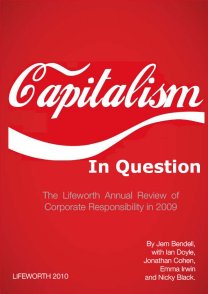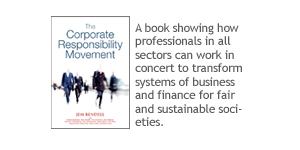Post-crisis, Capitalism now a focus for CSR, says Lifeworth Review
Capitalism is up for debate, and that’s a good thing, according to a new review from a management consultancy. “The dual financial and climate crises are leading people in all walks of life to question the kind of economy that makes sense for their businesses, communities and families,” explains lead author of the review, Associate Professor Jem Bendell. “As well as some anger at bankers, the financial crisis has led many to ask deeper questions about finance in general and, therefore, about capitalism. From bars to seminars, bookshops to board meetings, capitalism is being discussed – openly and critically,” he claims.
Entitled “Capitalism in Question”, the annual review describes how politicians and even business leaders are calling for more critical assessment of what kind of economic system we need for a fair and sustainable future. The review from Lifeworth Consulting summarises over a dozen books that have been published in the last weeks that debate the relative merits of capitalism and what form of economic governance is needed post-crisis, and in a new era of economic power. “The majority of these new books seek to do something that previously seemed neither necessary or interesting − to defend capitalism,” says John Stuart of Greenleaf Publishing, which supports the review.
Bendell explains that defensiveness wont help. Referring to the “Restoring Trust” report overseen by Allianz, Barclays Capital, Blackstone, and Carlyle Group, among others, he said “seeking to defend one’s immediate interests, as the banks writing the recent World Economic Forum report clearly did, is not how we are going to discover together the next step in our economic evolution. Fearful people in incumbent institutions may waste our time with diversionary drivel, but real exploration of the core issues is unavoidable. The question now is who should participate and how.”
Co-author of the review, Lifeworth Consulting’s Ian Doyle, explained that “much of the corporate social responsibility, or CSR agenda, has been predicated on a belief that government is constrained by global finance and can, or should, only intervene in markets to a limited extent. The giving of huge amounts of money to private banks may suggest that global finance is still dominant, but it also shows that sometimes when called on to act, most governments will intervene in markets in dramatic ways. So it’s not unreasonable for people to look to their governments to now shape responsible business practice more than before. And that is what we are seeing.”
The review is a call for people to become more involved in exploring how to evolve economic systems to promote fair and sustainable societies, says Bendell. “We are calling for this kind of engagement because after doing nine years of quarterly responsible business trends analysis for the Journal of Corporate Citizenship, we have concluded that there is a nascent social movement for the transformation of business and finance. Behind the jargon of corporate social responsibility, corporate accountability, environmental management, social enterprise, and responsible finance, are people like you and me who want to change the way business does business and the way money makes money. As such we need to think through what we are aiming for, longer term, and how we can work in concert. We all need to look up from our projects and shape the unfolding programme of economic transformation.”
To contribute to the debate, Lifeworth offers a framework for democratising capitalism. As Bendell, who is also Lifeworth’s director explains, “It’s simply that we need more governance of capital by people who are directly affected by its ownership and control. From that one concept flow many implications for tax, currencies, stocks, and all social and environmental regulations. This democratisation of capitalism could be the ultimate goal of the corporate responsibility movement, and the seeds of this approach are already to be found in the ideas and practices of many people working on corporate responsibility today.”
A discussion of economic systems can seem distant from the day-to-day preoccupations of most executives and the academics who seek to educate them, but as Bendell suggests, “making such connections will be important if the corporate responsibility movement is to have a substantial and lasting effect on commerce and society.” In ‘Capitalism in Question’ some initial guidance is given for how business leaders and educators can play a socially progressive role at this time. Specific multi-stakeholder initiatives are recommended.
The review of trends in corporate responsibility during 2009 includes analysis of government stimulus packages, responsible tax management, responsible mining, responsible cosmetics and beauty businesses, as well as particular trends in Asian and Francophone countries. It also explores the potential of ‘design thinking’ for sustainable business innovation, and provides in-depth analysis of the implications of the Copenhagen climate summit.
“Deep changes will be required in economic governance if we are to achieve a sustainable society… Capitalism will change, there is no doubt, and it must change so that it delivers both private wealth and public good” explains Professor Malcolm McIntosh of the Asia Pacific Centre for Sustainable Enterprise. “As we enter a period of potential reconfiguration of economic governance, leaders of organisations will need to better understand the issues, actors and dynamics to be successful. Part of Griffith Business School in Australia, Professor McIntosh’s centre supported the free release of this review to promote creative thinking at a time of critical global challenges and because “the lead author Jem Bendell, is an important commentator on the world stage.”
Dr Bendell says there are important implications for management education. “In Griffith’s new “Graduate Certificate for Sustainable Enterprise” we help our students to navigate increasingly complex social and political contexts so they can find ways to prosper by being part of the solution.”
‘Capitalism in Question: The Lifeworth Annual Review of 2009′ is available in pdf for free download at http://www.lifeworth.com/capitalisminquestion.pdf
Lifeworth’s responsible enterprise trends analysis during 2010 can be obtained by subscribing to the ‘Journal of Corporate Citizenship’. New subscribers to the journal before March 31st 2010 receive all 2009 copies for free. Visit http://www.greenleaf-publishing.com
Information on Griffith’s research centre and graduate certificate is available at http://www.asiapacificsustainableenterprise.com/
For media enquiries about ‘Capitalism in Question’ contact Jem Bendell via connect [at] lifeworth.com or +44(0)2071936102








